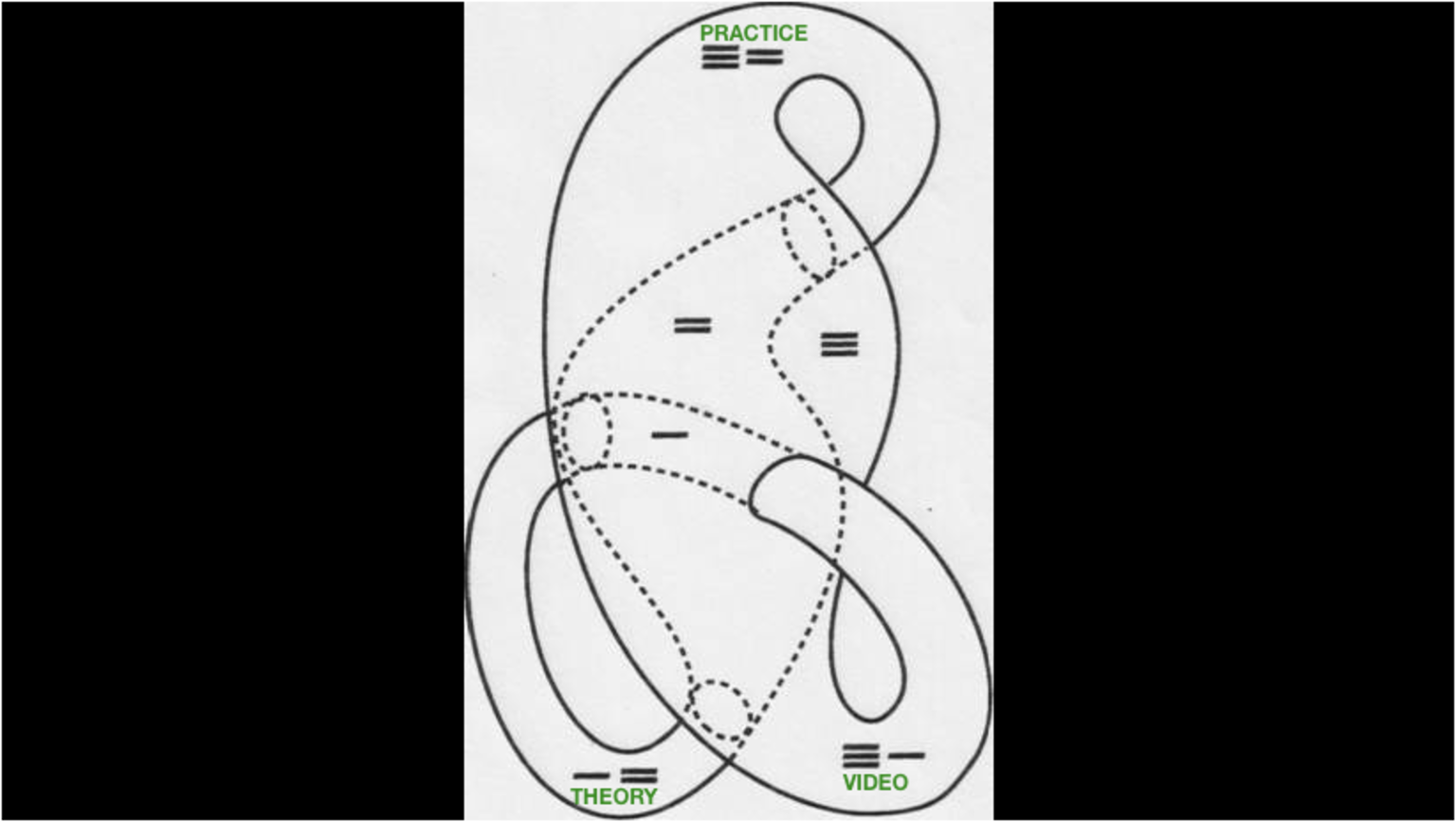Forelesning

#01—Receptions of Spinoza
3-way talk with Dániel Péter Biró, Bojana Cvejic and Theodor Barth, with each their take on Spinoza's Ethica.
See the talk in vimeo: https://vimeo.com/420234566
Register in Zoom here and receive a link to the webinar.
We are 3 professionals differently engaged in artistic research, with each our take on Spinoza’s Ethica. What we have to show, tell and share on this posthumous work of Spinoza, will be differently aligned at your end, than before the Corona pandemic: since video is added to the ‘equation of alignment’.
Dániel Péter Biró is a composer (Bergen). Bojana Cvejic (Brussels)is a philosopher working with dance & choreography. I am a social anthropologist (Oslo) working with principally in the design-field. We have different practices. Our theoretical takes on Ethica differently “bleed” from our practices.
In addition, there is video: which means that you—each one of your in the audience—are not lost into the darkness of an auditorium, or a black box, but are each one of you located at home. Under regular circumstances this would be your comfort-zone. Our challenge now is to make it a contact-zone.
This is a concept from Mary Louise Pratt’s “The arts of the contact zone”. We are presently living in the edgelands of contamination and connection. Or, more precisely, we are living with a temporarily enhanced awareness of it. We have to align theory, practice and video into our domestic reception.
Which is why the title of our 3-way talk—Receptions of Spinoza—makes the problem of ‘alignment’ in Spinoza’s ethics, particularly relevant: if we each compared our diaries on how we are adapting theory, practice and video to the present work conditions, we are like to be surprised by the variety.
But if our computer-screens are windows to our contemporary culture— whether we are working, educating ourselves or seeking entertainment—our home-windows are now theatres for another sort of spectacle: in April 2020 Space X is rocketing trains of sunlit Starlink satellites, to globalise 5G.
While industrial designer Elon Musk is doing his business with Tesla and SpaceX—offering a truly cosmic spectacle right outside our windows—we are being faced with the architecture of a celestial dome (finally) looking back, while at the same time as it is being light-polluted by our (owned) public eye.
Spinoza’s relevance, in this context, goes beyond his engagement with the high-tech of his day—his lens-fabrication for e.g. Christiaan Huygens telescope— and what Baruch and Christiaan may have observed together looking into the sky with it in May 1655, to his ideas on metaphysical accountability.
This is arguably what his work Ethica has to offer: his breakdown of a stepwise procedure—modelled on geometry—to account for human lifeworlds, in questions that are fundamentally exceeding them: how this scale and our human life-worlds can connect. Our time is short, the task is huge.
On this backdrop, we are using this occasion to look into artistic research: how practice, theory and mediation align in Dániel Péter Biró’s project Sounding Philosophy, and how this work with Spinoza’s Ethica, reverberates with other alignments in dance, choreography, design and the Corona pandemic.
prompt theodor.barth@khio.no ⵒⵕⵧⵎⵒⵝ
https://see.library.utoronto.ca/SEED/Vol4-1/Ryan.htm
The arrangement is a collaboration with the Design departement and the Academy of Dance at KHiO, and KMD in Bergen.
Conference abstract Dániel Péter Biró
Composing Spinoza’s Ethics: Charting a Migration of Spirit Through Sound
Dániel Péter Biró, Professor for Composition
Grieg Academy – Department of Music, Faculty of Fine Art, Music and Design
University of Bergen
In 2017 I was commissioned by the Swiss Philosophical Society to compose a Festakt composition for their conference, entitled “What is Mind.” This composition employed textfrom the second chapter of philosophical work Ethics entitled “On the Nature and Origin of the Mind.” I have continued this work as a Guggenheim Fellow, creating a multi-movement composition cycle, which is profoundly influenced by research in the field of ethnomusicology.
In the fall of 2011, I was Visiting Professor in the Department of Computing and Information Sciences of Utrecht University, Netherlands where I worked on the Tunes and Tales Project, supported by the Government of the Netherlands, which focused on the study and
transcription of various Dutch oral traditions. During this time, I recorded and transcribed examples of Jewish and Islamic chant as practiced in the Netherlands, working with a group of musicologists and computer scientists at the University of Utrecht and Meertens Institute in Amsterdam. Using advanced computer technologies for musical analysis and transcription, we set out to chart historical developments of these chant traditions within these communities and beyond. This ethnomusicology research in ongoing.
Living in The Hague, I found an apartment just down the street from the burial site of Baruch (Benedict) Spinoza. Spinoza, while one of the greatest philosophers in the seventeenth century, was banned from the Portuguese Synagogue in Amsterdam because of his views,
which proved to be too radical for his time. In his philosophical treatise Ethics, Spinoza attempted to present a new type of theology, one that was autonomous from organized religion, such as that of his own Portuguese Jewish community and of the dominant Calvinist
doctrine of the Netherlands.
The current composition cycle explores Spinoza’s philosophy of the mind while considering the historical dilemma of a 17th century Jewish immigrant in the Netherlands from the perspective of modern-day globalized existence. Following this historical trajectory, my
composition integrates phonetic aspects of Spinoza’s text with melodic material derived from Portuguese plainchant from the time of the Jewish expulsion, Torah trope from the Portuguese synagogue in Amsterdam, and Indonesian Qur’an recitation. Integrating elements of these chant traditions from Dutch immigrant communities of the past and present into the composition cycle, I explore the continuing relevancy and complexity of Spinoza's Enlightenment project and its relationship to chant practices in the Netherlands of yesterday
and today. While Spinoza dealt with problems of persecution, immigration, assimilation and tradition in a society dominated by Calvinist thought, these very issues become creatively engaged in his Ethics, which, while written in isolation, served to transgress the boundaries of contemporary religious doctrine. I will discuss how the composition cycle deals with these issues, touching on present-day issues of isolation, migration and changing recitation traditions within the context of an ever-evolving globalization.
More information:
https://www.researchcatalogue.net/view/634973/634974
Dániel Péter Biró: Nulla Res Singularis, Schola Heidelberg, Ensemble Aisthesis, Walter Nußbaum

